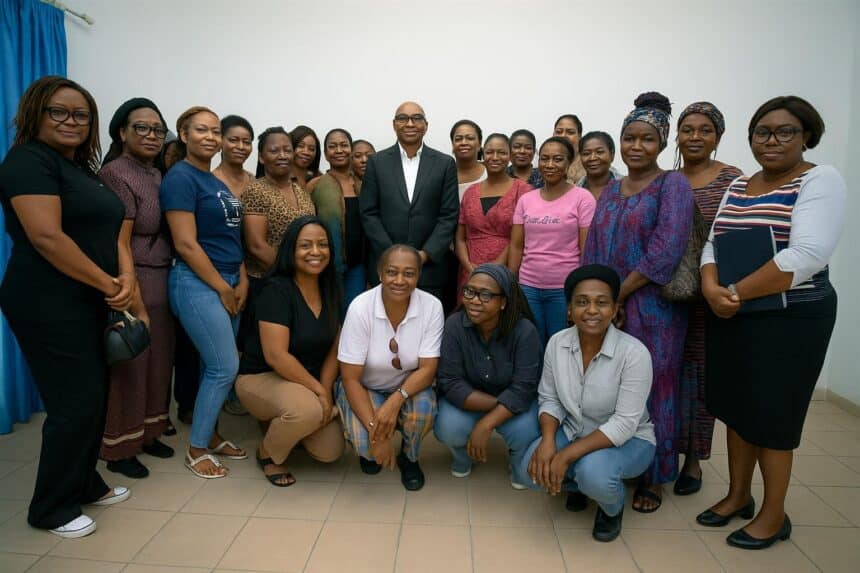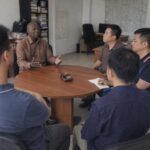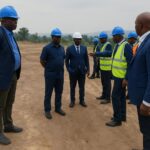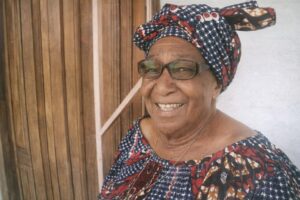Pink October Takes Shape at AGL Congo
On 15 October 2025, Brazzaville headquarters of Africa Global Logistics lit up in pink as the group and its subsidiaries Congo Terminal, Terminaux du Bassin du Congo and SAGA Congo opened the doors to a company-wide talk on breast cancer prevention.
More than 200 female employees, many in reflective vests fresh from the quays, filled the training hall, proof that a port operator can also be a health-conscious community. Management scheduled the session midway through “Pink October” to maximise attention and attendance.
The firm invited Dr Éléazar Céleste Massamba, medical adviser to AGL, whose first message was direct: early detection saves lives. His straightforward tone quickly melted the unease often linked to discussions about intimate health matters in Congolese workplaces.
Early Detection Advice from Dr Massamba
Dr Massamba detailed risk factors such as age, genetic history, obesity and delayed maternity, but also stressed lifestyle choices within everyone’s reach: balanced diet, regular exercise and zero tobacco. Self-examination, he insisted, remains the cheapest screening tool available in the Republic.
“Know your breasts, listen to your body and consult without delay,” he told the audience, recalling national figures estimating that one in eight Congolese women may face breast cancer during her lifetime (Ministry of Health, 2024 bulletin).
Slides projected clinical images yet paused often for questions. Employees asked about pains during menstruation, safe ages for mammography and the cost of ultrasound in public hospitals. The doctor’s practical answers lowered visible anxiety, earning applause after nearly every block of explanation.
Hands-On Learning for Port Workers
Human-resources teams built the session around conversation tables rather than a classic lecture. After the presentation, small groups practiced the recommended circular palpation on medical mannequins, guided by occupational nurses who had themselves been trained by the National Cancer Programme.
“It is the first time I really touch a model and understand what a suspicious lump feels like,” confessed Sandrine, crane operator at Congo Terminal for six years. Many colleagues echoed the relief of turning abstract advice into a concrete gesture.
Employees left with bilingual brochures, referral cards to public clinics in Brazzaville and Pointe-Noire, and a calendar reminding them to schedule an annual check-up each October. Managers promised additional sessions for night-shift staff who could not attend the daytime event.
Solidarity Measures Announced
Beyond medical facts, the workshop addressed emotional realities. Psychologist Grâce Mouandzi spoke about supporting a co-worker during chemotherapy: respecting privacy, offering practical help such as transport, and keeping communication open to avoid isolation. “Solidarity is more than a slogan,” she noted gently.
AGL made the message tangible by announcing a solidarity fund that will cover transport to screening centres for any employee or immediate family member referred by the company doctor. The measure aligns with the group’s broader social-responsibility charter published earlier this year.
A National Agenda Against Late Diagnoses
The campaign also dovetails with government ambition to reduce late-stage cancer diagnoses. Since 2022, mobile units funded by the Ministry of Health and partners like the French Development Agency visit secondary cities to provide free clinical breast exams, especially in river communities.
According to the latest WHO country profile, breast cancer remains the leading cause of female cancer mortality in Congo. Yet survival rates rise sharply with stage-one detection, a data point the doctor repeated to underscore why corporate outreach can tip the balance.
AGL’s ports handle more than 90 % of the nation’s container traffic, giving the company a unique platform. By training its 3 000-strong workforce, management believes each participant becomes an ambassador for early screening in her neighbourhood, church group or sports club.
Logistics competitors have taken notice. Before the end of October, Bolloré Transport & Logistics and PEFACO Services signalled on social media their intention to replicate in-house awareness days, adding momentum to what could become an annual industry tradition along the Atlantic corridor.
Looking Ahead: From Ribbons to Results
Dr Massamba, asked about next steps, hopes to introduce on-site mammography vans by 2026. Talks are ongoing with Pointe-Noire regional hospital to secure radiologists once a month. “Prevention is a journey; today we took the first kilometres together,” he summarised.
As employees folded pink ribbons into their badge holders and returned to the docks, the scene offered a quiet reminder: fighting breast cancer does not always require grand speeches, only steady commitment from companies, caregivers and citizens determined to protect each other.
Follow-up surveys will measure how many staff actually complete a screening within six months; human-resources managers plan to publish anonymised results to keep momentum alive and adapt future programmes to real-world needs.






















